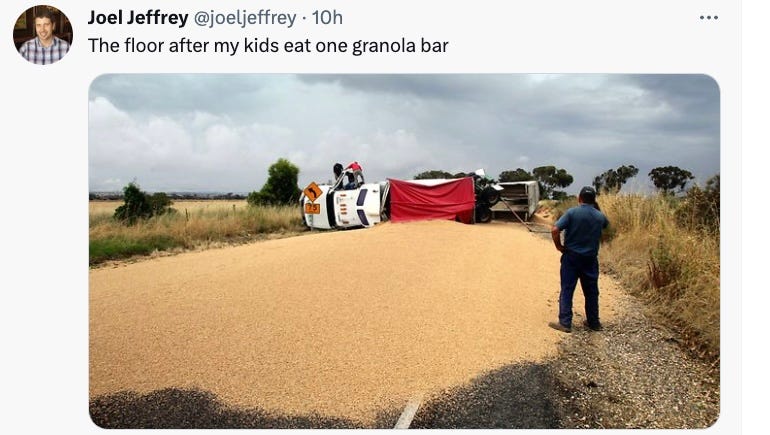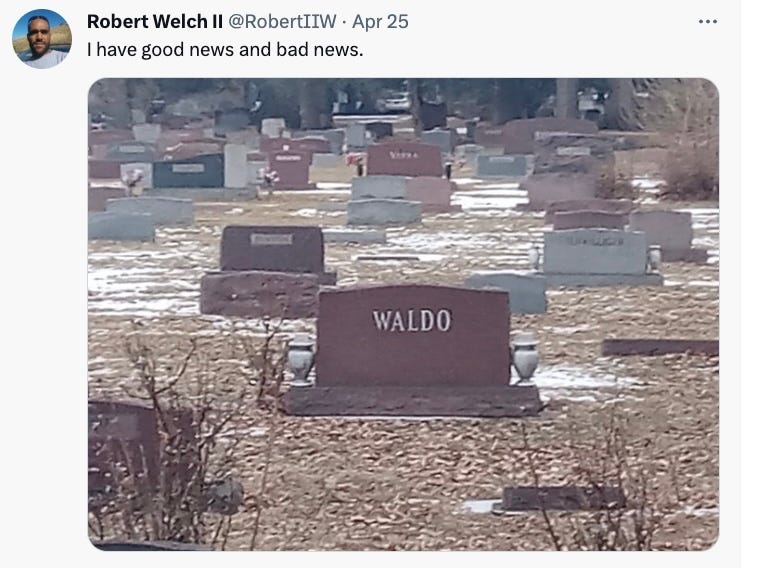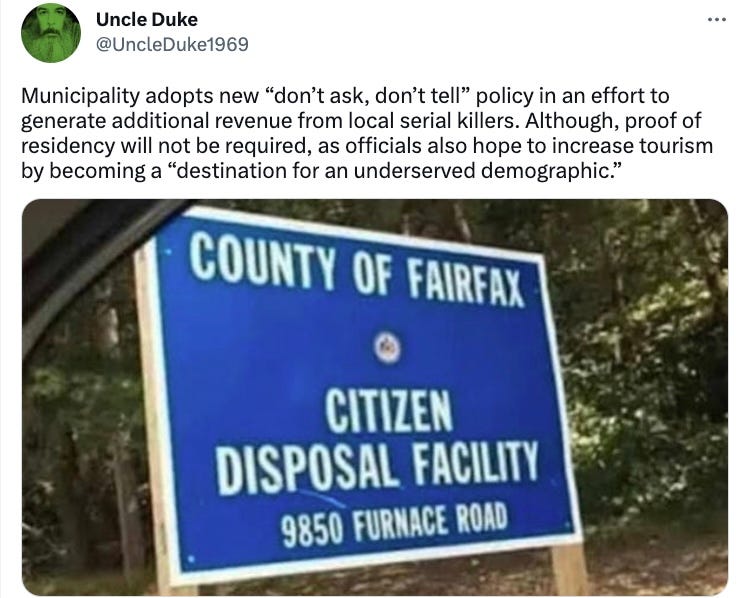Like good neighbors, Picayune Sentinel readers are there
a emailbag full of dissents and reflections on the news and my views
To read this issue in your browser, click on the headline above.
5-2-2023
Eric Zorn is a former opinion columnist for the Chicago Tribune. Find a longer bio and contact information here. This issue exceeds in size the maximum length for a standard email. To read the entire issue in your browser, click on the headline link above. Become a paid subscriber to receive each Picayune Plus in your email inbox each Tuesday and join our civil and productive commenting community.
Notes and comments from readers —lightly edited —- along with my responses
Jay G. — Regarding your friend's cancellation of his homeowner's policy by State Farm after a third property claim since 2019 (“Unlike a good neighbor, State Farm drops a longtime customer over storm damage”) you asked: "How does it make sense to punish individuals for weather-related damage at a time when we’re seeing more and more extreme weather events?"
From the insurer's perspective, it makes perfect sense. Insurers are in the business to collect premiums, not to pay claims (their advertising to the contrary notwithstanding).
As climate change-driven weather "extremes" become increasingly common, you're going to see insurers start placing certain limits on weather claims and increase premiums for coverages that payout for weather damage.
I’m surprised that your friend was surprised that his insurance was cancelled after submitting three claims in four years. When my wife and I ever suffered a claimable loss, we always went through the mental exercise of balancing the out-of-pocket expense against what we presumed would be the likelihood of a cancelled insurance policy for making a claim. For example, we replaced, at the expense of $1,000, wet basement carpeting when our sump pump failed during a heavy rainstorm.
We've made similar calculations when it came to automobile damages. Is it worth making the claim against our policy or not? To maximize your coverage protection and keep your premiums at a modest level, it may be in your overall best interests to limit your insurance claims to truly (or near) catastrophic claim amounts. It sucks, but them's the breaks.
Zorn: All very sensible information and advice, and just the sort of information and advice that an insurance agent or insurance company should provide to policyholders when they’re preparing to file claims. Transparency would demand that an insurer provide, up front, the estimated increase in premium payments or the cancellation that would attend a claim.
Because the truth that you and many other correspondents on this topic identified is that in at least some cases, filing a claim can easily cost you more in the long run than the claim itself is worth. My guess is that the reason this truth isn’t more heavily promoted is that in many cases, we carry “insurance” against losses we can actually afford to cover.
You need insurance against potentially crippling financial catastrophes — liability in auto and home accidents, for instance. Many of us don’t need insurance to cover a $1,000 loss (for, say, soggy basement carpeting), and if we do in the moment, then we’ve probably paid at least $1,000 in premiums over the years for that protection. Because the insurance company wins — it has to win — in the long run. As you point out, they are in the business of making money.
We’re tempted to file such claims because, hell, we’ve been paying into the fund for all those years. But for smaller damages, most of us would be better off banking those premiums and self insuring. Rich people should never have collision insurance on their cars — statistically it’s a bad bet, and one they can afford to lose. And almost none of us should ever pay for extended warranties on appliances
Joanie W. — In “Maybelline faces boycott over partnership with trans influencer Dylan Mulvaney” you criticized Mulvaney’s “campy, alienating caricature of womanhood.” But I suggest you cut her a little slack.
If you are transgender and the family and the culture in which you grew up forces you for years to be the sex you are not, that can cause you to develop a lot of self-hatred. When you transition, you are very fragile in a way. You are finally together, your innate sense of who you are for the first time in your life is congruent with your social presentation and, if you undergo medical procedures, congruent with your physical body.
You are awash with new feelings. You embrace everything you missed in your first puberty. If you are a transgender woman, you experiment with makeup, you buy short skirts, etc. You tend to embrace the cultural gender expectations that you were prohibited from going anywhere near when you were forced for years to be someone you were not.
It is often said in the transgender community for this very reason that publicity should not be given to folks who just transitioned. It takes time to become the person you would have been had your family and society not required you to live for years as someone you aren’t. I am 15 years into my transition. I rarely wear makeup; I’m a ferocious feminist; a lesbian; and I wear jeans most of the time when I’m not in court working as a lawyer. But when I first transitioned, I was a little like Mulvaney, a kid in a candy store, if you will.
Zorn: As usual, Joanie, you provide an interesting and valuable perspective on trans issues. I would refer readers to our online dialogue that concluded a little more than a year ago in which I raised the issue of cultural stereotypes and gender identity. When we ask, “What does it mean to be a woman?” or “What does it mean to be a man?” it seems as though our answers fall back on stereotypical — and quite superficial — modes of attire and presentation and interests. And/or we engage in a somewhat circular discussion that says one’s gender identity is how one identifies one’s gender.
Rima — You were fairly generous in your overall assessment of Cook County State’s Attorney Kim Foxx last week when you were writing about her announcement that she won’t seek reelection in 2024 for a third term. But please don't forget the R. Kelly case and the plight of his alleged victims, women who will not get justice because Foxx decided not to prosecute Kelly in their cases.
Zorn: I understand that anger and bitterness that these alleged victims feel that Kelly will likely not face charges for what he allegedly did to them, but I hope they will ultimately take solace in the very high likelihood that other convictions in similar cases will see him locked up for the rest of his life, or for at least as long as he would have been locked up had Foxx pursued those particular charges.
It’s easy for me to say, I suppose, but I applaud Foxx’s decision not to invest considerable public resources in what would almost certainly end up being a symbolic prosecution.
Cinda P. — I listened to the recent Mincing Rascals podcast and enjoyed it. I was surprised, however, to hear you question why so many suburban schools have nicer facilities yet do not spend as much per student as Chicago Public Schools does. Most of the suburban districts have the right-sized facilities for the number of students they educate, so there is not the additional drag of maintaining huge old buildings, most of which are very expensive to heat and cool due to their age and size. If CPS had closed the 129 buildings that former Mayor Rahm Emanuel’s Commission on School Utilization listed as “candidates for closure” in 2013 rather than just the 50 that CPS did close, there would be a lot less money going to operate and staff buildings that were built to house 2,000 students and now only a couple of hundred at most, and more money for educational supplies, teachers salaries, social workers etc. No one wants to close schools but the alternative is to just keep throwing money to maintain expensive old buildings instead of developing quality educational programs for kids.
Zorn: There is obviously some truth to your claim — operating schools that are way too large for their student populations generates higher per-pupil costs. But I wish I knew more about this overall topic. I know that quite a lot has been written about the deleterious effects of school closings on neighborhoods — see Eve Ewing’s book, “Ghosts in the Schoolyard Racism and School Closings on Chicago’s South Side” and WBEZ-FM’s “A Generation Of School Closings,” for example. And I know that Chicago Public Schools, like most urban school systems, are tasked with dealing with multiple challenges in educating disadvantaged students that suburban school systems do not face to the same degree.
I went poking around online looking for research or articles that would shed more light on your point and my tentative rejoinder, but most of what I found were sites that underscored the common belief that suburban schools have greater per-pupil expenditures than big-city schools. So I hope someone reading this can provide illumination on the question of why some suburban districts pay less per pupil than Chicago does.
Peter Z. — You quoted a series of tweets to back up your assertion that the “far left” was wroth with Mayor-elect Brandon Johnson for endorsing Joe Biden. Gee, now the "far left" includes people who want to increase the minimum wage and protect working families?
Zorn: Not necessarily. But the “far left” contains far too many people who don’t understand that the only way to increase the minimum wage and protect working families — not to mention to advance single-payer health care, guard civil liberties and fight the scourge of gun violence — is to realize how the political game is played and not to make the perfect the enemy of the good. I had this argument four years ago with those who were backing Bernie Sanders over Biden when it had become pretty clear that Biden was the clear Democratic frontrunner and the nation’s best hope at preventing four more years of Donald Trump. They continued to dwell on Biden’s shortcomings and try to dampen Democratic enthusiasm for going to the polls, which I found both foolish and dangerous. And I’m prepared to argue that Sanders would have had to govern more or less as Biden has governed because of the leanings of Congress and the courts.
Dennis M. —I'm disappointed you would use the language of the auto industry by calling what happened to John Greenfield a "freak accident." All accounts of what happened to John is that he was struck by an unsecured culvert pipe that flew off a pickup truck, and the the driver was totally at fault The media and the public in general need to stop using the word “accident” to describe acts of automobile violence, which are almost always the result of dangerous and illegal behavior. The number of people killed in this country every year by automobiles should be a national disgrace, not something that is downplayed in our language as being unavoidable and blameless.
Zorn: You make a good point about the word “accident.” I was attempting, perhaps inartfully, to suggest that Greenfield’s injuries were not the result of careless bicycle riding, or even necessarily bicycle riding at all. He could’ve just been standing there. And I know that anti-bicycle people tend to seize on any mishap involving a bicyclist to advance their brief against bicyclists. Meanwhile, Greenfield’s publication, Streetsblog Chicago, reported Friday, “John’s condition improves while doctors and family discuss moving him to Chicago.”
SLM. — I say that the winning visual tweet last week was photoshopped. I doubt there was a gas pump with a label on it reading “Caution, do not insert in mouth or rectum.”
Zorn: My guess is that the photo was genuine but that the label was stuck on the pump as a prank. One can purchase such labels online for $5 and slap them anywhere. I chose the entry as a finalist because I thought the indignant caption, “Oh, I’m sorry, I thought this was America” was exquisite.
Marc M. —Another great interview with Doug Fraser, “Homeless advocate on housing asylum seekers in Chicago: ‘What’s going on here?’ I really admire his clear, concise, pragmatic and intelligent answers. I was pleased to see that CBS 2 News has had a couple of stories about the migrant housing and support system.
Zorn: Me, too. Fraser speaks with knowledge and compassion about the issue, but comes at it pragmatically.
Rick L. — I don’t understand the Tweet of the Week nominee, “Why is time Irish?” by @thesulk. My friends didn’t understand it either.
Zorn: You are clearly not alone. It’s the last-place tweet so far in the poll. I understand it as a joke about "o'clock."
The flimsy case against ‘human composting’
I posted with approval to Facebook a link to Jeremy Gorner’s Tribune Page One story, “Human composting raised in Illinois legislative debate: ‘People should become part of the earth.” A bill to allow for the practice in Illinois has passed the state House and is now languishing in committee in the state Senate facing opposition from the Illinois Cemetery & Funeral Home Association. In the comments I got a response from Stephen Mendelsohn of New Britain, Connecticut, who was part of the effort that blocked a proposal to legalize the practice in that state in 2021 (a similar effort this year appears also to lack enough support for passage).
He shared his testimony to a legislative committee, which I reproduce here in full:
Let us not be fooled by euphemisms like “natural organic reduction” and “terramation.” Section 2 of HB 6485 seeks to promote human composting—the disposal of deceased human beings as if they were garbage to be recycled into soil and fertilizer. We are dealing with a profound devaluation of human dignity when we treat the human body in this manner, even if some people willingly consent to it. It is antithetical to the dignity of green burial supported by Section 1.
I am Jewish, and come from a tradition where natural burial in the earth upon death is a mitzvah—an obligation. Traditional Jewish funeral practices are almost entirely consistent with green burial, neither hastening nor interfering with the natural decomposition process. Our halacha does not permit environmentally damaging practices like embalming or metal caskets—only plain pine without nails, or no casket as is the custom in Israel. Cremation is even more strongly forbidden to us—something that was done to our people by the most murderous antisemitic regime in history and not something we would consider for ourselves. Reducing human bodies to soil and fertilizer through human composting reminds us of those of our martyrs whose bones were also turned into fertilizer, whose fat was turned into soap, and whose skin was flayed off and turned into lampshades.
Yael Davidowitz of the Chevra Kadisha of South Jersey as well as Last Kindness writes of alternatives to burial:
Let’s take a quick look at those alternatives to burial. Cremation incinerates the body, obliterating it to the point that even its DNA is destroyed. Alkaline hydrolysis uses lye to reduce the body to a goop that is simply disposed of through the sewer system. Once used solely by serial killers and drug cartels, this method is now legal in 20 states. Human composting, the latest “advance” in disposing of the deceased, is currently legal in just five [now six—SM] states…. A response to the oversized carbon footprint of cremation, human composting involves putting a human body into a rotating steel drum that turns it into one cubic yard of dirt in just a few weeks time. The common effect of these disparate methods is to deny the body any sense of sanctity, to obliterate it as quickly and as thoroughly as possible.
Some things are, indeed, garbage, but not everything. Both a Torah scroll and a human body are physical objects; they do not last forever. But when a Torah scroll becomes unusable, when it has fulfilled its purpose here on earth, we gently bury it in the ground.
We don’t toss it into a blue recycling can, and we certainly don’t burn it or flush it or use it as fertilizer for our garden.
The human body, with its spark of G-dliness, is even more precious, more holy, than a Torah scroll. And yet it has become acceptable to dispose of as if it were as ordinary as a banana peel.
In contradistinction to green burial*, there is nothing “natural,” “organic,” or even gentle about human composting. After most of the flesh has decomposed, at least some bones need to be pulverized just as with cremation.
The libertarian argument will be made that human composting is merely another “end of life choice” that we should respect no matter how offensive we may personally find it to be. I am certainly loathe to tell others how to live their lives and have no intention to impose my beliefs and practices on others. Nonetheless, in this case, I believe we need to draw a line, as this practice will inevitably impinge on the rights and dignity of others.
If we allow deceased human beings to be reduced into soil and fertilizer, then there is no way to stop the co-mingling of “human compost” with other soils and fertilizers and the sale and use of “human compost” to grow food—something that is unlikely with ash from cremations. Section 2 (i)(1) of HB 6485 allows for the “retention” of the composted remains if they are not scattered or buried, and there are no criminal penalties for using “human compost” to grow food or to sell it for commercial use. Of the six states that have authorized human composting, only Colorado has a restriction on the sale of “human compost” or of its use in the food supply.
In any case, I believe such a provision will prove to be entirely unenforceable, as there is no way to distinguish “human compost” from other soils, especially when they are mixed together. Will we be compelled to become unwitting existential cannibals, unable to know if we are consuming produce tainted with “human compost”? Soylent Green is no longer futuristic—it is here now.
This is also a religious liberty issue. Halacha strictly forbids deriving benefit from a corpse, unless it is necessary to save a life. Will rabbis need to inspect every farm to ensure that no “human compost” is used in order to certify that the farm’s produce is kosher? What are the implications for kohanim—Jews who are descendants of Aaron, brother of Moses—who have added restrictions in terms of having to avoid being in the same place as a corpse, save for burying an immediate family member or someone who has no one to bury them (met mitzvah)? … And what about other religious faiths (e.g., Islam) that may have similar objections to this involuntary benefit from “human compost”?
And finally, since radical environmentalists see human composting as better for the Earth than even green burial, we are likely to face a future where being composted upon death will not be a choice but rather a duty, and those who cling to burial will be stigmatized as enemies of the planet and pressured into being involuntarily composted. Human composting is part of “deep ecology” extremism which views humans as the enemy of the planet. It is in opposition to the mainstream perspective which views humanity as the pinnacle of creation and commands us to guard our environment because doing so is necessary for human flourishing. We must never sacrifice human dignity on the altar of “deep ecology.”
It is deeply saddening to see our legislators raise a bill like HB 6485 for public hearing with no sense of moral outrage or of the ick factor inherent in this legislation. If you believe as I hope most people do, that human beings are not mere recyclable garbage and have inherent dignity even in death, then please remove Section 2 from HB 6485. The laudable goal of promoting green burial should not be contaminated by the radical dehumanization of human
Mendelsohn wrote that he’s “certainly loathe to tell others how to live their lives and have no intention to impose my beliefs and practices on others,” but then went on to do just that, using paranoia and hysteria — existential cannibalism! Soylent Green! inevitable mandatory human composting! — to justify denying others the choice of availing themselves of a safe method of disposing of their remains in a way that they happen to consider supremely dignified, even sacred, after a fashion.
Government is not bound to impinge the freedom of others in order to guard certain religious inclinations and beliefs — those who want their food grown in certain types of soil only (soil uncontaminated by composted swine carcasses, say ) are certainly free to arrange for that. But those who see such “contamination” as merely symbolic — Mendelsohn himself admits “there is no way to distinguish ‘human compost’ from other soils” — ought to be free not to follow that practice.
A sectarian society can’t and shouldn’t constrain its practices to protect people from microscopic contraventions of their dietary preferences, whatever their motivation. It should protect the health and safety of the people and guard their freedoms that don’t impinge on the rights of others. And a functioning state Senate shouldn’t be held hostage by an industry guarding the practice of pumping corpses full of chemicals and stuffing them in the ground in expensive boxes.
* “In a typical green burial, the body is not cremated, prepared with chemicals, or buried in a concrete vault. It is simply placed in a biodegradable container and interred in a gravesite to decompose fully and return to nature.” (source)
Poll positions
In other words, 68% of respondents who do use social media would not give up their favorite social media platform for one year for $100. Meanwhile, there is still time to vote in the very tight waffles/pancakes poll if you haven’t yet. Click here.
Ya gotta see these tweets!
I often run across tweets that rely on visual humor and so can’t be included in the Tweet of the Week contest (the template I use for that poll does not allow me to include images). Here are a few good ones I’ve come across recently:
Vote for your favorite. I will disqualify any tweets I later find out used digitally altered photos. I’ll share the winner in Thursday’s main edition.
There’s still time to vote in the conventional Tweet of the Week poll! It’s quite a tight race this week.
Thank you for supporting the Picayune Sentinel. To help this publication grow, please consider spreading the word to friends, family, associates, neighbors and agreeable strangers.
.
















You wrote: "But the “far left” contains far too many people who don’t understand that the only way to increase the minimum wage and protect working families — not to mention to advance single-payer health care, guard civil liberties and fight the scourge of gun violence — is to realize how the political game is played and not to make the perfect the enemy of the good." I LOVE this and have to remember the phrase "...(don't) make the PERFECT the enemy of the GOOD" when talking to my well-meaning leftie friends.
Citizen Disposal Facility didn’t need a back story. The picture alone is hilarious; the story smothers it.